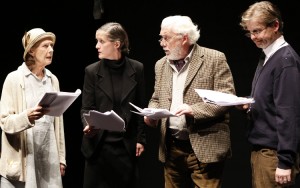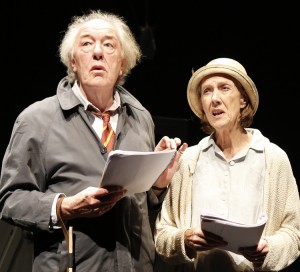The correspondence of director Alan Schneider and his friend Samuel Beckett indicates that the Irish playwright never wanted his radio play All That Fall adapted for theatrical presentation. His response to an overture by Schneider, entrusted with numerous Beckett plays during the author’s lifetime, including Waiting for Godot, indicates Beckett’s final decision was essentially “Let it stay as it is.”
Happily, British director Trevor Nunn hasn’t heeded that advice, and his stage adaptation works wonderfully well. How to turn a radio play into a piece of theater? Set it in a radio station with the actors portraying actual voice performers. Cherry Truluck’s set features 10 microphones hanging from the ceilings in a zigzag pattern in a gray room. A half dozen chairs on either side of the room allow for sitting for the actors as they await their cues, and recording is signaled by a red light over an upstage door. For verisimilitude, Paul Groothuis’s sound effects don’t always synchronize with the actors. As Eileen Atkins’s Mrs. Rooney trudges in the studio, after all, her actual footsteps don’t need to be aligned with the scraping sounds provided for radio listeners. Nunn’s ingenious concept allows the play to breathe for the stage.
It helps that Nunn has assembled a sterling cast, headed by acting legends Atkins and Michael Gambon as her blind, irascible husband. The action consists of Mrs. Rooney’s walk to the train station to meet her husband’s train, and their walk back to their home in a storm. But there’s no mistake that this is a Beckett play: it’s bleak and funny; it mocks religion, underlines the misery of life, and leaves you in an exhilarated funk. If you’re new to Beckett and want to just dip your toe in, these 75 minutes are a good way to start.
As Mrs. Rooney sets out, she meets various residents of her Irish village. There’s Christy (Ruairi Conaghan), driving a cart with a donkey that he beats, upsetting Mrs. Rooney: “No, no, enough! Take her by the snaffle and pull her eyes away from me. Oh this is awful!” The theme of life itself as a painful burden arises again when she encounters Mr. Slocum (Trevor Cooper) in his car. After a comical interlude with Slocum trying to push Mrs. Rooney into the car and finally succeeding, he runs over a chicken. “What a death!” cries Mrs. Rooney. “One minute picking happy at the dung, on the road, in the sun, with now and then a dust bath, and then — bang! — all her troubles over.”
But even the routine inquiries about loved ones elicit unhappy news. When she meets a bicyclist, Mr. Tyler (Frank Grimes), she asks, “What news of your poor daughter?” “Fair, fair,” he responds. “They removed everything, you know, the whole...er…bag of tricks. Now I am grandchildless.” Near the end of the play she asks a young boy, Jerry, “How is your poor father?” and Jerry answers, “They took him away, Ma’am.” “Then you are all alone?” she asks. “Yes, Ma’am,” says the boy.
Though the existential woes are relentless, they mix cheek by jowl with comedy. The kind but unappreciated Slocum at one point sits in silence, prompting Mrs. Rooney to ask, “What are you doing, Mr. Slocum?” Slocum’s deadpan answer: “Gazing straight before me, Mrs. Rooney, through the windscreen, into the void.”
Religion, too, takes a hit. Discussing the vicar’s text for the Sunday service, Mrs. Rooney tells her husband, “The Lord upholdeth all that fall and raiseth up all those that be bowed down” (Psalm 145:14). There’s a pause as Gambon’s gruff, boisterous Rooney and his wife take it in, then they erupt in derisive laughter.
Beckett aficionados will recognize recurring elements from other plays: a young boy, Jerry, echoes the messenger boy in Waiting for Godot; Mr. Rooney is blind, just as Hamm in Endgame (played terrifically in a 2004 West End production by Gambon, who wore dark glasses) and Pozzo in Godot; a reference to a ditch calls to mind the same in Godot. Some of the writing is obviously mordantly funny; not so obvious is what an actress like Atkins can make of a simple line such as “Do you want some dung?”
Gambon makes a relatively late entrance, but provides a solid foil to Atkins’s worn down, caviling wife. The blind Mr. Rooney rails like Lear, and it is surely no accident that they make their way through a pelting rain to get home. It makes one realize that Gloucester’s line “As flies to wanton boys are we to th' gods/They kill us for their sport” might have been written by Beckett rather than Shakespeare.
All That Fall plays through Dec. 8. Evening performances are Tuesday through Thursday at 7 p.m. and Friday and Saturday at 8 p.m. Matinees are Wednesday and Saturday at 2 p.m. and Sunday at 3 p.m. There will be no performance on Thanksgiving Day, Nov. 28. Single tickets are $70 and may be purchased by calling Ticket Central at 212-279-4200 or going to www.59e59.org.



